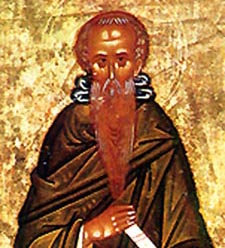|
|||
|---|---|---|---|
| This weekly bulletin insert complements the curriculum published by the Department of Christian Education of the Orthodox Church in America. This and many other Christian Education resources are available at http://dce.oca.org. | |||

Saints who are given the title "Confessor" rather than "Martyr" are those who witnessed to the faith and often suffered for it, but were not put to death as the direct result of their witness. Saint Chariton the Confessor was one of these. He did undergo imprisonment and torture when he boldly professed his faith, but was not martyred. God saved him for greater work. Born in about 254, Chariton belonged to a well-respected family in the city of Iconium (now Konya, in Turkey) which was also the home of another saint named Thecla, a young woman who for three solid days listened from her window to Saint Paul's preaching on his first missionary journey. She was so convinced by what she heard that she later became a missionary herself, preaching and teaching as a helper to Paul. Thecla was an example to Chariton. He began to speak publicly and often about his dedication to Jesus Christ. Before long he was arrested by the governor, and told to stop insulting the gods by claiming that only the one God of the Christians was real. But the governor had no success with Chariton, who told him that the pagan gods were merely prideful demons who had been cast out of heaven into the depths of hell because they hated God and refused to worship Him. At first the governor tried to talk Chariton out of his beliefs. But Chariton chose to challenge him, trying to make him examine his own beliefs and see their superficiality. Chariton said, "If your gods are truly worthy of worship, you shouldn't be letting me deride them and trying to reason with me. Why don't you defend them, and silence me once and for all?" He went on, "Do your gods feel with their hands, or speak with their mouths, or see with their eyes? No, they do none of these things. They are dead idols, and they are nothing like the living God, Jesus Christ, and His Father in heaven." The governor wasn't ready to hear any more, or to test the truth of Chariton's words. He ordered that the outspoken Christian be beaten and put in prison, where he was routinely tortured. Chariton did not die in prison, and when the harsh measures against Christians were lifted, he was released. Setting out for Jerusalem, he was waylaid by robbers. But once again, though hurt, he didn't lose his life. He gave up his plans to live in a city, and went into the desert.
The later years of Chariton's life were given to the establishment of two monasteries, the first in the wilderness of Pharan and the second near Jericho. Both became well-known for the holiness of the men who came to live in them, learning from the example of Saint Chariton. We don't know why some saints died as martyrs and others, though tested and made to suffer, did not. But the martyred ones apparently had finished their work. Some, like Saint Chariton, were being saved for greater work still to be accomplished. |
|||
